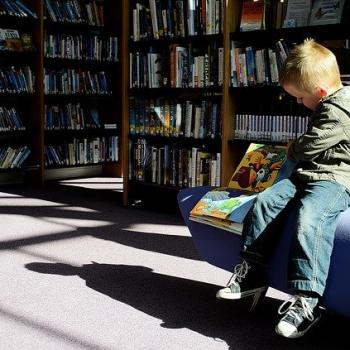 Matthew Walther, the decidedly curmudgeonly editor of the wonderful Catholic magazine The Lamp, is always worth reading—and his recent essay, “What Killed Cultural Aspiration,” is no exception. Amidst a cultural moment that tends to insist that video games are no less “art” than the paintings of Jasper Johns or Mark Rothko, Walther shamelessly celebrates the value of highbrow culture for its own sake.
Matthew Walther, the decidedly curmudgeonly editor of the wonderful Catholic magazine The Lamp, is always worth reading—and his recent essay, “What Killed Cultural Aspiration,” is no exception. Amidst a cultural moment that tends to insist that video games are no less “art” than the paintings of Jasper Johns or Mark Rothko, Walther shamelessly celebrates the value of highbrow culture for its own sake.
And yet Walther’s essay shouldn’t be read as an exercise in snobbishness, but as a defense of the value of aspiration as a kind of “wanting-to-master-the-highbrow.” He observes that “[i]n recent years a kind of shrill dismissiveness has taken over even in the vanishingly small space still afforded to literary criticism, and the idea of difficulty in literature is dismissed and (oddly for any admirer of Virginia Woolf or Marianne Moore) reflexively male.” But what do we lose when we lose the idea of literary difficulty as something worthwhile?
At least in my life, the very act of wrestling with difficult texts has proven to be a profoundly rewarding exercise. New constellations of thought and experience come into view when one reads a book like Shusaku Endo’s The Samurai, Sigrid Undset’s Kristin Lavransdatter, or Marcel Proust’s Swann’s Way, offering a deeper and more awe-inspiring understanding of the world and of human life. And that’s just on the fiction side of things; it took me weeks of painful struggle to make it through Martin Heidegger’s Being and Time, but with that behind me, whole galaxies of Continental thought now feel comprehensible for the first time. Almost nothing brings me more joy than the kind of intellectual stretching that comes with working through a very challenging book and making it “mine.” As I see it, the depths of this created beauty are ultimately reflections of the depths of the uncreated God.
And when this kind of reading and study is abandoned, writing tends to suffer in turn.
One of the more unsettling trends I’ve noticed in culture writing over the past several years is that—beyond the really premier publications like The New Yorker—so much of it feels profoundly decontextualized, stripped of any grounding in a bigger context of art and literature and thought. There tends to be a lot of meditation on how a given work of art engages (or fails to engage) contemporary political conditions, or how it fits into the context of a particular creator’s body of work as a whole, but not much about any intellectual influences dating back before about 1950 or so. (Seriously, just pop over to Rotten Tomatoes and browse the “Top Critics” reviews of any popular show or film.)
This tendency towards deracination really struck me a couple months ago, when I realized for the first time that Guillermo del Toro’s film Pan’s Labyrinth is very clearly influenced by the ancient Gnostic “Hymn of the Pearl.” I guess this is a thing I would’ve expected some top-tier critic, somewhere—presumably with an Ivy League diploma in hand—to have previously picked up on. I am certainly not an expert on Gnosticism myself; this just seems like the sort of connection that anyone with a robust education in the Western civilizational tradition could make. (I would bet $50 that Walther himself would have noticed it.)
At the lower end of the prestige spectrum, of course, there’s an endless stream of fluff pop-culture articles with titles like “The Ending of ‘The Batman’ EXPLAINED.” This particular kind of “movie analysis” always strikes me as directly downstream of the pedagogical method of a standard AP English class—one that focuses mostly on tracing out plot points like the gears of a machine, and picking up on low-hanging symbolic allusions. The text under investigation, on this approach, is something to be figured out rather than internalized. Walther even remarks witheringly in his essay that “conversations with dozens of former Great Books students leave me with the impression that these texts are understood as an undifferentiated word-mass that exists to be stripmined for ideas (or worse, enlisted in unedifying culture war skirmishes without having been read).” It’s a bracing observation, and seems accurate to me.
In any case, the point is this: if we haven’t hit it already, I suspect we’re on the verge of what might be called a “Great Forgetting,” or a major decline in subject-matter familiarity with the substance of our literary, artistic, and philosophical tradition. For years, plenty of commentators have pointed out the problem of increasing biblical illiteracy—a gap that, itself, renders much of Western literature only semi-intelligible. But I’d guess that soon we’ll come to a point where a whole generation or two of writers and critics, many educated in top-flight institutions, simply won’t have much of any“knowledge base” upon which to draw. Offhand references to Captain Ahab pursuing his white whale, or to the deviousness of Uriah Heep, will be met with general incomprehension.
What would it take to reverse this? At bottom, I think Walther is right that it’s time to recover aspiration as a genuine good, to recover a sense of the intrinsic value of struggling with (and so learning from) a dense, “highbrow” book or symphony. All reading time isn’t created equal: I do read throwaway thrillers here and there, but I try not to make that my entire diet.
From an academic standpoint, it’s worth emphasizing while “critical thinking skills” are obviously important, they must be adjuncts to the actual acquisition of subject-matter knowledge. Tools are no good apart from some material upon which to work. That said, I’m not particularly optimistic that colleges can instill the broader “virtue of intellectual struggle” as such. At least for my part, in college I was so focused on maintaining a solid GPA and building out a resume dense with extracurriculars that I simply didn’t have time to marinate in high-value books. Maybe that’s the meritocratic system’s fault, or maybe it’s mine.
But to the extent it’s within my power today, I want to resist the creep of this “Great Forgetting” as much as possible. Now that I’m a dad, I want to pass along to my son the Great Illustrated Classics volumes that were my entry point to the “Great Conversation” in the first place. I want to read him the Beginner’s Bible. And I want us to talk together about all of it.












